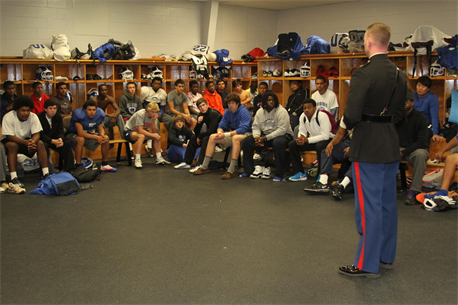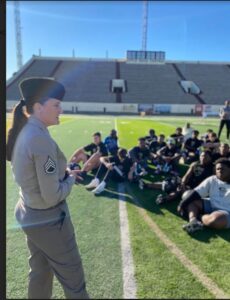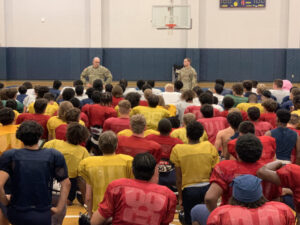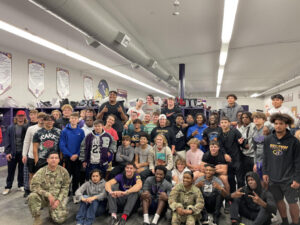
As the U.S. military continues to struggle to meet its recruiting goals, Ohio-based marketing consultant DistrictWON is working to replenish the pool of young Americans who are willing to serve in the U.S. Armed Forces by reimagining high school recruiting.
In days gone by, a recruiter for the U.S. Armed Forces would set up a table in a high school lunchroom hoping students would approach them with questions about serving in the military. These days, however, recruiters said sparking students’ interest in careers in the military isn’t so simple.
“We are experiencing the most challenging recruiting landscape in a generation,” U.S. Army Secretary Christine Wormuth told a Senate Appropriations Defense Subcommittee hearing in early May.
To address that, DistrictWON is helping recruiters connect with student athletes to talk about the leadership opportunities and career options the military can provide.
Peter Fitzpatrick, CEO of DistrictWON, said working with the U.S. Army and Marine Corps to expand their recruiting programs capitalized on DistrictWON’s access and the military’s needs. The Rocky River, Ohio-based company specializes in creating marketing partnerships that inspire community and brand interaction and has thousands of scholastic partners across the nation.
“We have been working with various branches of the military for a couple of years,” Fitzpatrick said. “They see the unique access and engagement we can provide to the high school community. Access to these communities and specifically through the schools is often hampered by lots of red tape; we can effectively cut through that barrier in an efficient and exciting manner.”
As part of the collaborative effort, DistrictWON worked to create “leadership/teamwork” sessions in high schools, he said, presented through the athletic department. By hosting sessions for multiple sports teams within a school and by engaging students in team-building activities, the recruiters can break through barriers and talk with students about their potential as leaders within the military after they graduate from high school.
The sessions have changed the dynamic of recruiting from a passive “wait and see” exercise to an active engagement with many students. Over 90% of the sessions drew 20 or more students and about half of the sessions involved 40+ students. Each session lasts :30 minutes to an hour.
 The U.S. Army partnership program at Flagstaff High School in Arizona is one that Coach Sean Manning is passionate about.
The U.S. Army partnership program at Flagstaff High School in Arizona is one that Coach Sean Manning is passionate about.
“For the past 13 years in high school sports, I have worked alongside many coaches who are veterans that have helped and prepared many students to pursue the military and enlist,” said Manning, who credits his military service for teaching him the life skills that helped him be successful in a 32-year career in law enforcement.
“These are the examples of fine young men and women alumni who I, when the timing is right, introduce them to our teams and allow them time to share their experiences and how the military helped them achieve their goals through experience and educational advantages,” he added.
Military partnerships with high schools are so important, Manning said, noting that he had limited opportunities to interact with recruiters during his own high school years. “Being part of and present during school activities and functions breaks down those barriers that exist because for many of these kids who haven’t been exposed to the military way of life through family members, they are intimidated by the uniform.”
With such a small percentage of the population having served in the military, Manning said: “Please continue using school athletics as a venue to reach our youth and more importantly, our student/athletes who are prepared to meet the physical demands of the occupation.”
Exposing students to branches of the military is one way that high schools can help young people explore important opportunities – such as traveling to new places and mastering new skills – that can lead to their success in life, said Athletic Director Earnest McGee of Little Rock Central High School in Arkansas.
The program facilitated by DistrictWON gives many of his high school’s low-income and middle-class students involved in athletics and other activities “the opportunity to learn about teamwork, hard work and perseverance in a way that they have not had a chance to experience before, or for some it is the first time they will have these types of opportunities,” McGee said. “These are essential life skills that are crucial for our young people who do not go off to college.”
 McGee, whose father served in the Air Force, has seen many lives transformed because of the exposure youths were given to the military. “Without the military, many young people do not get the chance to grow and develop into productive individuals in our society,” he said.
McGee, whose father served in the Air Force, has seen many lives transformed because of the exposure youths were given to the military. “Without the military, many young people do not get the chance to grow and develop into productive individuals in our society,” he said.
“I am so thankful for the commitment that all of branches of the military have made in the lives of so many of our young people.”
The impact the sessions with military representatives have had on student athletes has impressed school officials from across the country.
“Claremore High School athletes and Navy JROTC engaged in an hour-long discussion with the Marines, and it was professional in every regard,” said Jonathan Gelnar, the head baseball coach at Claremore High School in Claremore, Oklahoma. “I believe the Marines had access to students they normally would never have had, and our students received a discussion from another perspective than their regular teachers, coaches, and instructors.”
The popularity of the program has spread, Fitzpatrick said. In 2022, DistrictWON operated sessions at an estimated 200 schools in 10 states. This year, he anticipates the numbers will be much higher.
Local communities have gone from simply accommodating Army and Marines recruiters to celebrating their arrival, based on the positive responses the meetings have generated.
 “Schools have now contacted us proactively to see if we can bring one of these sessions into their community,” Fitzpatrick said. “That’s a huge departure from the past. The schools have embraced this approach. In fact, many schools that previously denied access to recruiters are wide open to these sessions.”
“Schools have now contacted us proactively to see if we can bring one of these sessions into their community,” Fitzpatrick said. “That’s a huge departure from the past. The schools have embraced this approach. In fact, many schools that previously denied access to recruiters are wide open to these sessions.”
Much of the program’s popularity is due to its focus on leadership – a fundamental in any athletic program.
“The program was timely and linked to topics of leadership and teamwork,” said Bill Stikes, athletic director of Fayette County High School in Fayetteville, Georgia, where Marine Corps recruiters visited with teams. “I like how it was more focused on these principles instead of just a recruitment pitch.”
The sessions left their mark on student athletes as well, officials said.
“The students spoke about the conversation for the rest of the day,” said DeMarco Hughes, athletic director at Chicago Tech Academy, in Chicago, Illinois, after Marines visited. “Several students on the basketball team were really reflective about their roles as leaders.”
The sessions helped students ponder their options after high school.
“This leadership talk opened the eyes to my student athletes as to how they can succeed outside of the athletic realm,” said Micah Hagans, athletic director for Bonnabel High School in Kenner, Louisiana.




